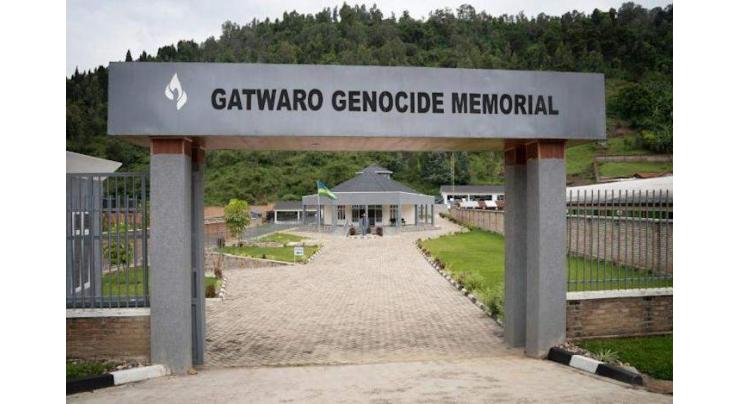
France And Rwanda: Ghosts Of Genocide Rattle Relations
Umer Jamshaid Published April 19, 2021 | 07:42 PM

France and Rwanda have had a stormy relationship since the 1994 genocide in the African nation
Paris, (APP - UrduPoint / Pakistan Point News - 19th Apr, 2021 ) :France and Rwanda have had a stormy relationship since the 1994 genocide in the African nation.
A new report from Kigali finds France "bears significant responsibility" for enabling the genocide.
Here is a timeline of their fraught relations.
- 1990: French go in - Rwanda's Hutu president Juvenal Habyarimana calls for help from France and former colonial power Belgium to fight off Ugandan-based rebels from the Rwandan Patriotic Front (RPF) led by Rwanda's current president, Paul Kagame.
Paris sends troops in what is called "Operation Noroit" in October, officially to protect its embassy and citizens there. But France also secretly helps train the Rwandan army.
- 1994: Genocide - On April 6 Habyarimana is killed when his aircraft is shot down over Kigali.
The next day the genocide begins. From April to July 4 around 800,000 people are killed, most of them from the Tutsi minority, as well as moderate Hutus.
The Tutsis are accused by the Hutu-dominated regime of colluding with the RPF, who had entered northern Rwanda from Uganda in 1990.
Some 500 French paratroopers evacuate more than 1,000 French citizens and foreigners.
- Operation Turquoise - On June 22 the United Nations gives France the green light for Operation Turquoise, a military operation in Rwanda with humanitarian ends.
The mainly Tutsi RPF accuses France of seeking to save the Hutu regime and the perpetrators of the slaughter.
Some 2,500 French soldiers create a safe humanitarian zone in the south west, effectively hindering the RPF's advance but also allowing fleeing genocide suspects to hide.
On July 4 the RPF seizes the capital Kigali, ending the genocide.
- 1998: French probe - A French parliamentary mission exonerates France from involvement in the genocide in December, but says it bears some responsibility due to strategic errors and "institutional dysfunction".
Rwanda insists France is guilty of genocide crimes.
- 2006: Relations broken off - French judge Jean-Louis Bruguiere recommends President Kagame be prosecuted by the UN-backed tribunal trying Rwanda's genocide suspects for suspected participation in Habyarimana's assassination.
He signs nine arrest warrants for Kagame's aides.
Rwanda breaks off diplomatic relations with France. Ties are not restored until November 2009.
- 2010: France admits mistakes - French president Nicolas Sarkozy acknowledges France made mistakes during the genocide.
But he stops short of apologising during the first visit to Rwanda by a French president since the bloodbath.
In September 2011 Kagame makes his first official visit to France.
- 2014: French genocide trials - A French court sentences a former Rwandan army captain to 25 years in prison in the country's first trial linked to the genocide.
In July 2016 two former Rwandan mayors are sentenced to life in jail in France.
- New Rwandan accusations - Twentieth anniversary commemorations of the genocide are held in Kigali in April 2014 without a French representative.
Kagame again accuses France of "participating" in the genocide.
- Detente - President Emmanuel Macron hosts Kagame in Paris in May 2018, saying the normalisation of relations is under way but "will no doubt take time".
In December French judges drop a long-running investigation into the killing of Habyarimana.
The probe had been a major source of tension between the two countries after seven people close to Kagame were charged.
In March this year a historical commission set up by Macron concludes in a damning report that France bears overwhelming responsibilities over the genocide and was "blind" to preparations for the massacres.
Kagame welcomes the report as an important step and says he is ready for a new phase in ties with France.
In April, a report commissioned by Kigali said France "was an indispensable collaborator in building the institutions that would become instruments of the genocide.""And still, it has not yet acknowledged that role or atoned for it," the report stated.
Related Topics
Recent Stories

Tennis: ATP Barcelona Open results - 1st update

Swiatek's perfect 10 in Stuttgart as Vondrousova stuns Sabalenka

Arandu's roads closed due to flooding

Oil tanker catches fire in Islamabad’s Blue Area

Pakistan committed to ensure safety of foreign nationals: FO

Tennis: WTA Stuttgart results - 1st update

Four passengers injured as train hit an empty vehicle

Over- speeding bus crushed to death two bike riders

Turkey's Freedom Flotilla ready to set sail for Gaza

French teen dies from heart failure after knife attack near school

Iranians appear unfazed by Isfahan blasts

UAF celebrates Int'l Chinese Language Day
More Stories From World
-
Togo lawmakers approve contested political reform
3 hours ago -
NATO must choose 'whether we indeed are allies': Zelensky
3 hours ago -
US House to vote on Ukraine, Israel, Taiwan aid package
3 hours ago -
Calls for calm after reported Israeli strike on Iran
4 hours ago -
IMF calls on EU to deepen single market integration to boost growth
4 hours ago -
Second Ecuadoran mayor killed ahead of anti-crime referendum: police
4 hours ago
-
Oil, gas drilling blocked in Alaska wilds as Biden seeks green cred
5 hours ago -
Man sets self on fire outside Trump trial
5 hours ago -

Turkey's Freedom Flotilla ready to set sail for Gaza
6 hours ago -

French teen dies from heart failure after knife attack near school
6 hours ago -

Iranians appear unfazed by Isfahan blasts
6 hours ago -

Ecuador mayor killed ahead of anti-crime referendum: police
7 hours ago



